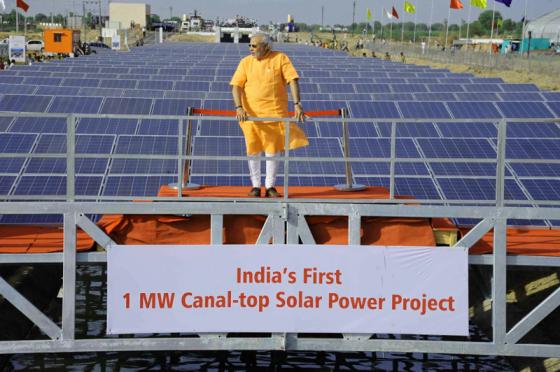At a time when there is a call for all countries to do more to fight climate change, India is telling the world at the ongoing UN climate negotiations, COP24, that it is in a position to comfortably overachieve its Paris climate change commitments, and will do more.
India had committed that by 2030, as much as 40 per cent of its installed energy capacity will be non-fossil fuel based.
Indian Ministry of New and Renewable Energy Secretary Anand Kumar told IANS here the actual number will be 60 per cent, even without taking into account large hydropower projects.
“Today, India has 73 GW of wind, solar and biomass capacity, and another 22 GW is under construction. Yet another 25 GW is in the process of being tendered out. That leaves 55 GW more to be set up by 2022 for India to meet its target of 175 GW,” Kumar said.
After 2022, India will auction 30 GW of solar and 10 GW of wind every year till 2030. By 2030, the country will have 350 GW of solar and 150 GW of wind installed capacity, he added.
The political phase of the ongoing UN climate negotiations that began on December 12 with ministers and high-level country representatives together with non-party stakeholders entered the last phase.
Each country was sharing its plans for the transformation of economies in line with the 2015 Paris goals.
The negotiations will culminate on Friday, hopefully with an agreement on the Paris rulebook for transparent implementation of the 2015 Paris Agreement — the first global treaty to reduce emissions by all rich and poor nations.
India’s Environment Minister Harsh Vardhan, who attended the climate summit last week, signalled that the country was ready to update its Nationally Determined Contributions (NDCs) if other countries do the same.
India was on track to meet majority of Paris goals and become a global climate leader by meeting one target a decade earlier, US-based Institute for Energy Economics and Financial Analysis (IEEFA) said in report on the margins of the UN climate summit.
The Paris agreement requested each country outline, update and communicate its post-2020 climate actions, known as NDCs, reflecting a country’s ambition for reducing emissions.
According to IEEFA, India’s NDCs included three key targets: To achieve 40 per cent of electric power installed capacity from non-fossil fuel by 2030, to reduce the emissions intensity of its gross domestic product (GDP) by 33-35 per cent from the 2005 level to 2030 and to create an additional 2.5-3.0 billion tonnes of carbon sinks — reservoirs that accumulate and store carbon dioxide, through the planting of additional forest and tree cover.
R.R. Rashmi, India’s former climate negotiator and Fellow at The Energy Resource Institute in New Delhi told IANS: “In terms of India’s efforts in reducing its emissions relative to its economic growth, it is a fairly positive story and it’s more significant because the energy growth is tremendous.”
Favouring the strong Paris rulebook, New Delhi-based Council on Energy Environment and Water Fellow Vaibhav Gupta said the Paris agreement came with a mandate which needs to be balanced and strong.
“The negotiations are stuck on contentious issues because there is no consensus reached by parties one way or another. A strong rulebook should strike a balance between action and support, between mitigation and adaptation, and between science and political will,” he said.
Anirban Ghosh of the Mahindra group said: “Renewables, energy efficiency, electric vehicle are a clear win. We don’t need external finance for these items, they pay for themselves.”
India on Wednesday said the Paris agreement was “non-negotiable” and there could be no compromise on the basic principles.
Source:Devdiscourse
Image Courtesy:TheIndianIris
You may also like
-
Trade Connect E-platform For Exports Is Single Window, Fast, Accessible And Transformational: Shri Piyush Goyal
-
Dot Simplifies Approval Processes For Telecom Licenses And Wireless Equipment
-
Coal Production and Supply Trends on Positive Trajectory
-
Union Minister To Release Booklets On Promotion Of Indigenous Species & Conservation Of States Fishes
-
2nd India-Japan Finance Dialogue held in Tokyo on 6th September, 2024
